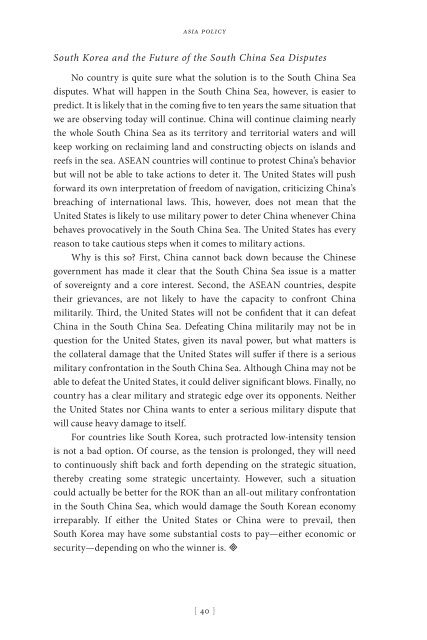You also want an ePaper? Increase the reach of your titles
YUMPU automatically turns print PDFs into web optimized ePapers that Google loves.
asia policy<br />
South Korea and the Future of the South China Sea Disputes<br />
No country is quite sure what the solution is to the South China Sea<br />
disputes. What will happen in the South China Sea, however, is easier to<br />
predict. It is likely that in the coming five to ten years the same situation that<br />
we are observing today will continue. China will continue claiming nearly<br />
the whole South China Sea as its territory and territorial waters and will<br />
keep working on reclaiming land and constructing objects on islands and<br />
reefs in the sea. ASEAN countries will continue to protest China’s behavior<br />
but will not be able to take actions to deter it. The United States will push<br />
forward its own interpretation of freedom of navigation, criticizing China’s<br />
breaching of international laws. This, however, does not mean that the<br />
United States is likely to use military power to deter China whenever China<br />
behaves provocatively in the South China Sea. The United States has every<br />
reason to take cautious steps when it comes to military actions.<br />
Why is this so? First, China cannot back down because the Chinese<br />
government has made it clear that the South China Sea issue is a matter<br />
of sovereignty and a core interest. Second, the ASEAN countries, despite<br />
their grievances, are not likely to have the capacity to confront China<br />
militarily. Third, the United States will not be confident that it can defeat<br />
China in the South China Sea. Defeating China militarily may not be in<br />
question for the United States, given its naval power, but what matters is<br />
the collateral damage that the United States will suffer if there is a serious<br />
military confrontation in the South China Sea. Although China may not be<br />
able to defeat the United States, it could deliver significant blows. Finally, no<br />
country has a clear military and strategic edge over its opponents. Neither<br />
the United States nor China wants to enter a serious military dispute that<br />
will cause heavy damage to itself.<br />
For countries like South Korea, such protracted low-intensity tension<br />
is not a bad option. Of course, as the tension is prolonged, they will need<br />
to continuously shift back and forth depending on the strategic situation,<br />
thereby creating some strategic uncertainty. However, such a situation<br />
could actually be better for the ROK than an all-out military confrontation<br />
in the South China Sea, which would damage the South Korean economy<br />
irreparably. If either the United States or China were to prevail, then<br />
South Korea may have some substantial costs to pay—either economic or<br />
security—depending on who the winner is. <br />
[ 40 ]


